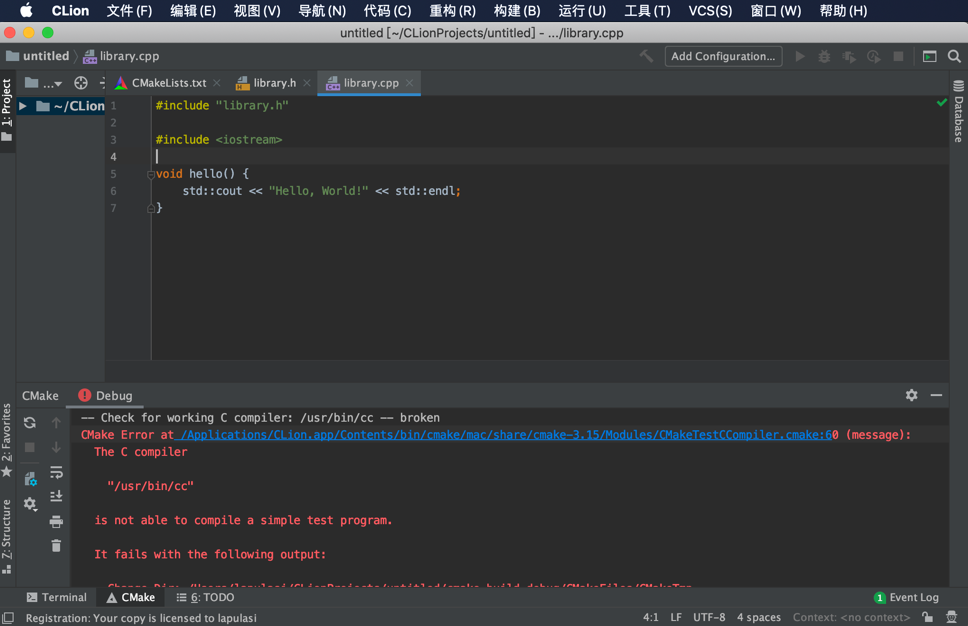

Use Valgrind Memcheck and Google Sanitizers integration to detect memory errors, data races and undefined behaviour issues. Level up your collaboration game and work on a CLion project with your colleagues in real time.ĭevelop for microcontrollers in CLion and benefit from various on-chip debugging options, Peripheral View for ARM devices, FreeRTOS thread view and STM32CubeMX integration.
#CLION DOXYGEN FULL#
Get the ultimate debugging experience for investigating and solving problems in your code.įor remote work, select between Full Remote Mode, WSL, or remote debugger setups. Adopt the keyboard-centric approach and select a keymap you prefer the most, or create your own easily.ĬLion is more than just an editor as it offers a powerful debugger and dynamic analysis tools to investigate and solve problems with ease, built-in Google Test, Boost.Test, Doctest and Catch for unit testing, many popular VCS supported out of the box and more.īuild, Run and Debug your application and unit tests in CLion. Select one of the default editor themes or customize them to match your personal preferences.
#CLION DOXYGEN CODE#
Static analysis (including DFA) for all supported languages highlights warnings and errors in the code immediately as you type and suggests quick-fixes. Write beautiful and correct code with CLion. Use refactorings to improve and clean up your code at the speed of thought. Save time on unnecessary typing while CLion generates code for you: from getters/setters to more complicated templates. Inspect the calls or types hierarchy and easily search everywhere for nearly everything (including IDE settings). Try smart completion, formatting and helpful views with code insight.įind your way through the code with instant navigation to a symbol, class or file. With an IDE that analyzes the context and understands your project, you can code faster than you think. CLion works with CMake, Makefile, Gradle and compilation database project models. It’s surprisingly easy to start a new project in CLion, and files can be added to the project in one click. Knowing your code through and through, it can boost your productivity with smart and relevant code completion, instant navigation and reliable refactorings. GDB alive packet not sent! (1003 ms).Trust CLion to take care of the routine while you focus on the important things. Warn : keep_alive() was not invoked in the 1000 ms timelimit. Info : STM32L flash size is 64kb, base address is 0x8000000 Target halted due to debug-request, current mode: Thread Info : accepting ‘gdb’ connection on tcp/3333 Info : Listening on port 3333 for gdb connections Info : starting gdb server for STM32L053R8Tx.cpu on 3333 Info : STM32L053R8Tx.cpu: external reset detected Info : STM32L053R8Tx.cpu: hardware has 4 breakpoints, 2 watchpoints Info : Unable to match requested speed 8000 kHz, using 4000 kHz Info : Listening on port 4444 for telnet connections Info : Listening on port 6666 for tcl connections The results might differ compared to plain JTAG/SWD Info : The selected transport took over low-level target control. Openocd -d2 -s C:\Users\atformio\packages\tool-openocd/scripts -f interface/stlink.cfg -c “transport select hla_swd” -f target/stm32l0.cfg -c “program verify reset shutdown ” Then I need to go to the STM32CUBE and program board with literary anything, and, when I return to the PlatformIO everything works fine. But, when I try to program it for second time I get error:Įrror: init mode failed (unable to connect to the target) When I first time build and program it, everything works just fine. I have one unusual problem with STM32 Nucleo-L053R8 board (original board).


 0 kommentar(er)
0 kommentar(er)
